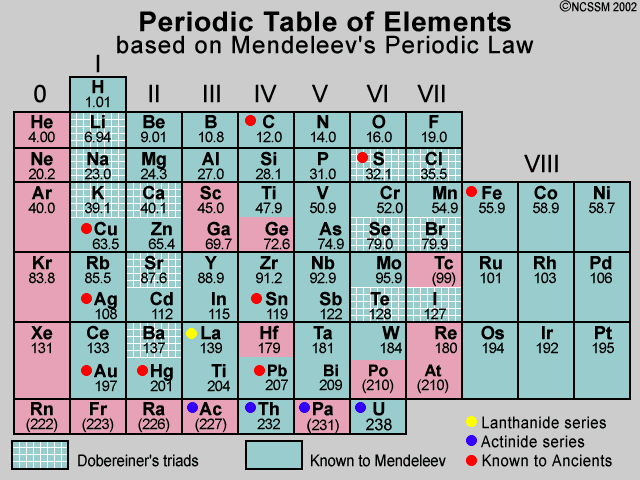Charting the Elements: The Enduring Legacy of Dmitri Mendeleev
Dmitri Mendeleev, the Russian chemist whose pioneering work laid the foundation for the modern periodic table of elements, stands as one of the most influential figures in the history of science. Born on February 8, 1834, in Tobolsk, Siberia, Mendeleev's extraordinary intellect, creativity, and tenacity revolutionized our understanding of the fundamental building blocks of matter and transformed the field of chemistry forever. Mendeleev's early years were marked by a deep fascination with the natural world and a voracious appetite for learning. Despite growing up in humble circumstances and facing numerous challenges along the way, including the untimely death of his father and financial difficulties, Mendeleev's passion for science and his innate curiosity propelled him forward on his path to greatness.
Mendeleev's early years were marked by a deep fascination with the natural world and a voracious appetite for learning. Despite growing up in humble circumstances and facing numerous challenges along the way, including the untimely death of his father and financial difficulties, Mendeleev's passion for science and his innate curiosity propelled him forward on his path to greatness.
In 1869, Mendeleev made his most significant contribution to science with the publication of his landmark work, "Principles of Chemistry." In this seminal work, Mendeleev presented his revolutionary concept of the periodic table, a systematic arrangement of the known elements based on their atomic weights and chemical properties. By organizing the elements into rows and columns according to their atomic structure, Mendeleev was able to identify patterns and relationships that had previously eluded scientists, laying the groundwork for a more comprehensive understanding of the structure of matter.One of the most remarkable aspects of Mendeleev's periodic table was his ability to predict the existence and properties of undiscovered elements based on the patterns he observed in the table. By leaving gaps in his table for elements that had not yet been discovered, Mendeleev was able to accurately predict the properties of these elements, including their atomic weights, chemical properties, and even their names. This extraordinary feat of scientific insight demonstrated Mendeleev's genius and established him as one of the preeminent chemists of his time.
Mendeleev's periodic table not only provided a systematic framework for organizing the elements but also paved the way for countless discoveries and advancements in the field of chemistry. His work laid the foundation for the development of the modern periodic table, which continues to serve as the cornerstone of chemistry education and research to this day. Moreover, Mendeleev's periodic table provided a framework for understanding the relationships between different elements and their compounds, opening up new avenues of inquiry and exploration in the field of chemical science. In addition to his groundbreaking work on the periodic table, Mendeleev made numerous other contributions to the field of chemistry throughout his career. He conducted pioneering research on the properties of gases, the nature of solutions, and the behavior of chemical reactions, among other topics. His tireless dedication to scientific inquiry and his relentless pursuit of knowledge earned him widespread acclaim and recognition as one of the foremost chemists of the 19th century.
In addition to his groundbreaking work on the periodic table, Mendeleev made numerous other contributions to the field of chemistry throughout his career. He conducted pioneering research on the properties of gases, the nature of solutions, and the behavior of chemical reactions, among other topics. His tireless dedication to scientific inquiry and his relentless pursuit of knowledge earned him widespread acclaim and recognition as one of the foremost chemists of the 19th century.
Moreover, Mendeleev's influence extended beyond the realm of science, as he played a prominent role in Russian society and politics during his lifetime. He served as a professor at the University of St. Petersburg and later as a member of the Russian Academy of Sciences, where he advocated for educational reform and scientific progress. He also served as a government official and advisor to the Russian czar, using his influence to promote scientific research and innovation in Russia. In his personal life, Mendeleev was known for his warmth, wit, and charm, as well as his deep love of music and literature. Despite his many achievements and accolades, he remained humble and approachable, always eager to share his knowledge and insights with others. He was a beloved figure in Russian society and a respected leader in the scientific community, revered for his intellect, integrity, and dedication to the pursuit of truth.
In his personal life, Mendeleev was known for his warmth, wit, and charm, as well as his deep love of music and literature. Despite his many achievements and accolades, he remained humble and approachable, always eager to share his knowledge and insights with others. He was a beloved figure in Russian society and a respected leader in the scientific community, revered for his intellect, integrity, and dedication to the pursuit of truth.
As we reflect on Dmitri Mendeleev's extraordinary life and legacy, we are reminded of the transformative power of scientific inquiry and the enduring impact of visionary thinking. His periodic table of elements stands as a testament to the power of human ingenuity and the beauty of the natural world, inspiring generations of scientists, students, and scholars to explore the mysteries of the universe with curiosity and wonder. In honoring Mendeleev's memory, we honor not only his remarkable contributions to science but also his enduring legacy of innovation, discovery, and enlightenment.
Mendeleev's legacy extends far beyond his scientific achievements; it encompasses his role as a trailblazer, a visionary, and a pioneer of scientific inquiry. His periodic table of elements not only revolutionized the field of chemistry but also laid the groundwork for advancements in physics, biology, and materials science, shaping the course of scientific progress for generations to come. Moreover, Mendeleev's commitment to education and his advocacy for scientific research and innovation continue to inspire scientists and scholars around the world. His emphasis on the importance of empirical evidence, rigorous experimentation, and open-minded inquiry served as a model for future generations of researchers, encouraging them to approach scientific discovery with curiosity, creativity, and a spirit of exploration.
Moreover, Mendeleev's commitment to education and his advocacy for scientific research and innovation continue to inspire scientists and scholars around the world. His emphasis on the importance of empirical evidence, rigorous experimentation, and open-minded inquiry served as a model for future generations of researchers, encouraging them to approach scientific discovery with curiosity, creativity, and a spirit of exploration.
Furthermore, Mendeleev's influence extended beyond the scientific community, as his periodic table of elements sparked a revolution in our understanding of the physical world and its underlying principles. It provided a framework for organizing and categorizing the vast array of elements that make up the universe, allowing scientists to unlock the secrets of matter and energy and to harness them for the benefit of humanity. In recent years, there has been a renewed appreciation for Mendeleev's contributions to science and his impact on the world. Museums, research institutes, and educational institutions around the globe have honored his memory with exhibits, lectures, and symposiums dedicated to exploring his life and work. His legacy continues to inspire curiosity, creativity, and innovation in the next generation of scientists, who look to Mendeleev as a model of excellence and a beacon of inspiration.
In recent years, there has been a renewed appreciation for Mendeleev's contributions to science and his impact on the world. Museums, research institutes, and educational institutions around the globe have honored his memory with exhibits, lectures, and symposiums dedicated to exploring his life and work. His legacy continues to inspire curiosity, creativity, and innovation in the next generation of scientists, who look to Mendeleev as a model of excellence and a beacon of inspiration.
As we celebrate the life and legacy of Dmitri Mendeleev, we are reminded of the power of human ingenuity, perseverance, and imagination to transcend the limitations of our understanding and unlock the mysteries of the universe. His periodic table of elements stands as a testament to the beauty and complexity of the natural world, inviting us to explore its wonders with humility, curiosity, and awe. In honoring Mendeleev's memory, we honor not only his remarkable achievements but also his enduring legacy of discovery, enlightenment, and scientific progress.




































